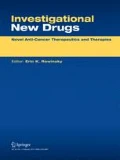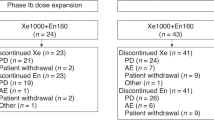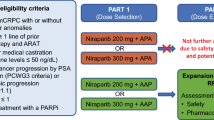Summary
Purpose Siltuximab is a chimeric, anti-interleukin-6 monoclonal antibody with potential therapeutic benefit in castration-resistant prostate cancer (CRPC) patients. We assessed the safety and tolerability of siltuximab in combination with docetaxel, the pharmacokinetics of docetaxel alone and with siltuximab, and the efficacy and pharmacodynamics of siltuximab plus docetaxel. Patients and Methods In an open-label, dose-escalation, multicenter, phase 1 study, patients with metastatic, progressive CRPC received docetaxel 75 mg/m2 q3w plus siltuximab 6 mg/kg q2w (n = 12), 9 mg/kg q3w (n = 12), or 12 mg/kg q3w (n = 15). Dose-limiting toxicity (DLT), PSA, and radiologic response according to WHO criteria were evaluated. Results DLT was reported in 1 of 11 patients receiving 6 mg/kg, 1 of 12 receiving 9 mg/kg, and in 1 of 14 receiving 12 mg/kg. Common Grade ≥3 adverse events were neutropenia (73 %), leukopenia (60 %), lymphopenia (30 %), dyspnea (19 %), and fatigue (14 %). Toxicities were not dose dependent. Siltuximab did not affect docetaxel pharmacokinetics. The pharmacokinetic profile for siltuximab in combination was similar to single-agent siltuximab pharmacokinetics. Twenty-three (62 %; 95 % CI 45 %, 78 %) of 37 combination-treated patients achieved a confirmed ≥ 50 % PSA decline. Of 17 patients with measurable disease at baseline, 2 confirmed and 2 unconfirmed radiologic partial responses ranging 190 to 193 days were achieved with 9- and 12-mg/kg siltuximab. C-reactive protein concentrations were suppressed throughout treatment in all patients. Conclusion These results suggest that siltuximab in combination with docetaxel is safe and shows preliminary efficacy in patients with CRPC, although alternative siltuximab schedules may be better tolerated for future studies.


Similar content being viewed by others
References
Smith PC, Hobisch A, Lin DL, Culig Z, Keller ET (2001) Interleukin-6 and prostate cancer progression. Cytokine Growth Factor Rev 12:33–40
Adler HL, McCurdy MA, Kattan MW, Timme TL, Scardino PT, Thompson TC (1999) Elevated levels of circulating interleukin-6 and transforming growth factor-beta1 in patients with metastatic prostatic carcinoma. J Urol 161:182–187
Hobisch A, Eder IE, Putz T et al (1998) Interleukin-6 regulates prostate-specific protein expression in prostate carcinoma cells by activation of the androgen receptor. Cancer Res 58:4640–4645
Sakai I, Miyake H, Terakawa T, Fujisawa M (2011) Inhibition of tumor growth and sensitization to chemotherapy by RNA interference targeting interleukin-6 in the androgen-independent human prostate cancer PC3 model. Cancer Sci 102:769–775
George DJ, Halabi S, Shepard TF et al (2005) The prognostic significance of plasma interleukin-6 levels in patients with metastatic hormone-refractory prostate cancer: Results from cancer and leukemia group B 9480. Clin Cancer Res 11:1815–1820
Smith PC, Keller ET (2001) Anti-interleukin-6 monoclonal antibody induces regression of human prostate cancer xenografts in nude mice. Prostate 48:47–53
Puchalski T, Prabhakar U, Jiao Q, Berns B, Davis HM (2010) Pharmacokinetic and pharmacodynamic modeling of an anti-interleukin-6 chimeric monoclonal antibody (siltuximab) in patients with metastatic renal cell carcinoma. Clin Cancer Res 16:1652–1661
Wang LZ, Goh BC, Grigg ME, Lee SC, Khoo YM, Lee HS (2003) A rapid and sensitive liquid chromatography/tandem mass spectrometry method for determination of docetaxel in human plasma. Rapid Commun Mass Spectrom 17:1548–1552
Tannock IF, de Wit R, Berry WR et al (2004) Docetaxel plus prednisone or mitoxantrone plus prednisone for advanced prostate cancer. N Engl J Med 351:1502–1512
Clarke SJ, Rivory LP (1999) Clinical pharmacokinetics of docetaxel. Clin Pharmacokinet 36:99–114
Fujita T, Yasuda S, Kamata Y et al (2008) Contribution of down-regulation of intestinal and hepatic cytochrome P450 3A to increased absorption of cyclosporine A in a rat nephrosis model. J Pharmacol Exp Ther 327:592–599
Jover R, Bort R, Gómez-Lóchon MJ, Castell JV (2002) Down-regulation of human CYP3A4 by the inflammatory signal interleukin-6: Molecular mechanism and transcription factors involved. FASEB J 16:1799–1801
Zhang X, Schmitt C, Grange S et al (2009) Disease-drug interaction studies of tocilizumab with cytochrome P450 substrates in vitro and in vivo [abstract]. Clin Pharmacol Ther 85:S59
Baker SD, Zhao M, Lee CK et al (2004) Comparative pharmacokinetics of weekly and every-three-weeks docetaxel. Clin Cancer Res 10:1976–1983
Rossi JF, Négrier S, James ND et al (2010) A phase I/II study of siltuximab (CNTO 328), an anti-interleukin-6 monoclonal antibody, in metastatic renal cell cancer. Br J Cancer 103:1154–1162
van Rhee F, Fayad L, Voorhees P et al (2010) Siltuximab, a novel anti-interleukin-6 monoclonal antibody, for Castleman’s disease. J Clin Oncol 28:3701–3708
Acknowledgments
This study was sponsored and the study agents were provided by Ortho Biotech Research & Development, now called Janssen Research & Development. Gary Hudes has served on an advisory board for Johnson & Johnson. Scott T. Tagawa has received honoraria from Sanofi-aventis and Janssen and has been a consultant/on an advisory board for Sanofi-aventis. Young E. Whang has no conflicts of interest. Ming Qi, Xiang Qin, Thomas A. Puchalski, Manjula Reddy, and Mark Cornfeld are or were employees of Janssen Research & Development. Mario Eisenberger has received commercial research grants from Sanofi-aventis, Astellas, Tokai, and Millennium. Jennifer Han of Janssen Services, LLC provided medical writing assistance.
Author information
Authors and Affiliations
Corresponding author
Electronic supplementary material
Below is the link to the electronic supplementary material.
Online Resource 1
Siltuximab pharmacokinetic parameter estimates (PDF 33.8 kb)
Online Resource 2
Comparison of docetaxel Cmax and AUCinf alone and in combination with siltuximab (PDF 13.1 kb)
Online Resource 3
PSA response (PDF 29 kb)
Rights and permissions
About this article
Cite this article
Hudes, G., Tagawa, S.T., Whang, Y.E. et al. A phase 1 study of a chimeric monoclonal antibody against interleukin-6, siltuximab, combined with docetaxel in patients with metastatic castration-resistant prostate cancer. Invest New Drugs 31, 669–676 (2013). https://doi.org/10.1007/s10637-012-9857-z
Received:
Accepted:
Published:
Issue Date:
DOI: https://doi.org/10.1007/s10637-012-9857-z




